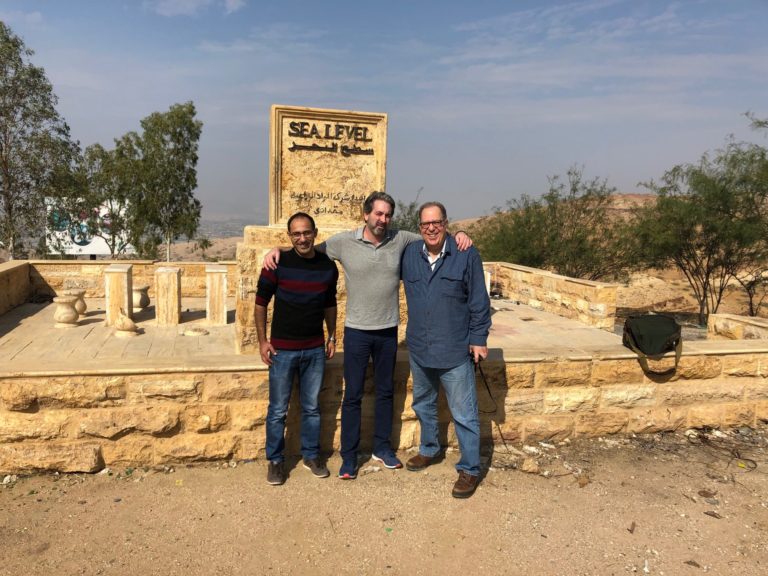
Co-written by Marc Yaggi & Gabrielle Segal
A major water crisis is gripping the Middle East. Freshwater resources are dwindling and more frequent droughts are driving landscape changes. Water scarcity and climate change already contribute to conflicts between and within nations, as is the case with Syria.
In general, conflicts escalate as resources become more scarce. But what if it were the other way around? Waterkeeper Alliance Affiliate Ecopeace Middle East, an organization that brings together Jordanian, Palestinian, and Israeli environmentalists, sees the region’s increasing scarcity of fresh water as an opportunity to build bridges of peace—while protecting the environment.
Just How Dry is the Region?
In the past 20 years, North Israel, Jordan, and South Syria have suffered 15 years of record-breaking drought. This is the longest, deepest drought in records going back to the beginning of the British occupation.
This drought, and other factors, affects the flow and water volume of the Jordan River, which is vital to the livelihoods of those living in the basin. The Jordan River flows along the border of Jordan, occupied Palestinian territory, and Israel, with the mouth of the river at the Dead Sea. Water levels in the Dead Sea are a stark indication of the Middle East Water crisis. Fifty years ago, the Jordan River flow to the dead sea was 1.3 billion cubic meters per year; today it is 30 million. The Dead Sea is now 25 percent the size it was in 1920, and is dropping one meter per year.
Why is the Jordan River So Low?
Most water from the Yarmouk, one of the Jordan River’s main tributaries, is diverted by Syria for agriculture and drinking; the Kingdom of Jordan takes whatever is left. Historically, the Yarmouk provided 450 million cubic meters of water per year to the Jordan River; it now provides a mere 1 million.
In the north, Israel’s Sea of Galilee is severely drying up. Israel’s national water carrier has pulled so much water from the Sea of Galilee that it is approaching the “black line,” at which point water can no longer be pumped without permanent damage to the aquifer. This caused the country to stop pumping water from the Galilee about three years ago.
With such little water flow, the Jordan has essentially become a sewage conveyance.
The Jordan River is now so dirty you can smell it from afar.
The Human Cost
The region’s water crisis adversely impacts public health, the economy, and regional stability. The Jordan River valley is a poverty hotspot: about half of the residents are unemployed.
Scarce water resources in the Jordan River Valley create economic hardship, which plays a key role in high unemployment rates and is a driver of regional instability and unrest. On the West Bank side, Israelis and Palestinians are competing over waning water resources which compound an already tense situation. On the Jordanian side, people receive only 12 hours per week worth of water from the utility. If they need any more water, they have to buy it at barely affordable rates.
A Solution: Environmental Peace Building
EcoPeace Middle East, a Waterkeeper Alliance Affiliate, was founded as a non-governmental organization in Taba, Egypt on December 7th, 1994 at an historic meeting amongst Egyptian, Israeli, Jordanian, and Palestinian environmentalists. Those in attendance had a common goal: To protect their shared environment through furthering sustainable development while creating lasting peace in their region.
One of EcoPeace’s biggest initiatives is to bring more water to the Jordan River, part of which will be done by advocating for Israel to contribute water from its desalination plants to the Sea of Galilee, as well as by convincing Jordan to release water from some of its dams. Much of the group’s work is based on grassroots, “Bottom Up”, community projects to engage everyone in the clean water movement.
For example, the Good Water Neighbors (GWN) project is EcoPeace’s flagship program for environmental peacebuilding by creating “local constituencies that empower youth, adult residents, mayors, and other municipal officials to call for and lead necessary cross-border solutions to regional water issues.”
The Sharhabil bin Hassneh Eco Park, a project under GWN, is a beautiful, green park and part of EcoPeace’s initiative to rehabilitate the Jordan River and the Jordan River Valley. The park provides visitors and residents of the Jordan Valley “close access to the unique local ecosystem, biodiversity and native species of the region, while simultaneously addressing the environmental implications of development.” EcoPeace also brings Israeli, Palestinian, and Jordanian kids together at this park to show them first-hand how ecology and the environment work, turning strangers into friends.
EcoPeace’s efforts to create sustainable water supplies involve creating jobs in the process. For example, the group trains female plumbers to convert residential homes into gray water systems. As part of their Water-Energy Nexus Project, EcoPeace researches sustainable policies that would create jobs and “counter the effects of climate change and its potential negative security implications, while providing solutions to water scarcity in the region.”
A Plan for the Future
The Middle East water crisis is daunting. However, EcoPeace has risen to meet the scale and magnitude of the crisis with its 127-project Jordan River Valley plan, which aims to restore the Valley’s ecological values and promote peace, prosperity, and security in the region. In total, the Jordan River Valley plan is projected to cost $4.5 billion. However, a major benefit of the plan is that it is projected to increase the GDP of the Jordan Valley from $4 billion a year to $73 billion per year by 2050.
EcoPeace plans to turn the water crisis into an opportunity to use everyone’s shared interest in water resources as a platform for peace, prosperity, and security.
Learn more about EcoPeace by signing up for their newsletter.